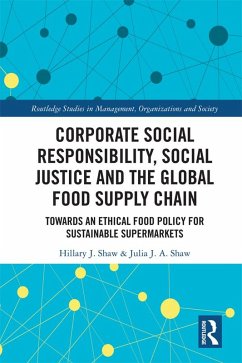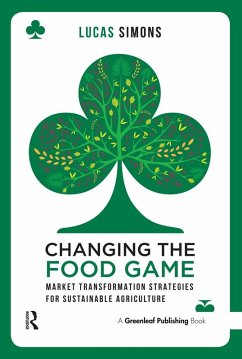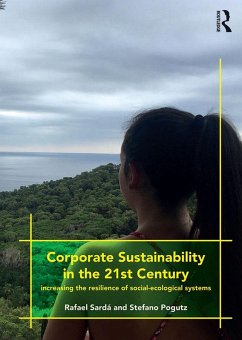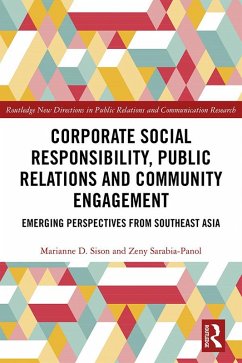
Corporate Social Responsibility, Social Justice and the Global Food Supply Chain (eBook, ePUB)
Towards an Ethical Food Policy for Sustainable Supermarkets
Versandkostenfrei!
Sofort per Download lieferbar
41,95 €
inkl. MwSt.
Weitere Ausgaben:

PAYBACK Punkte
21 °P sammeln!
Food is a source of nourishment, a cause for celebration, an inducement to temptation, a means of influence, and signifies good health and well-being. Together with other life enhancing goods such as clean water, unpolluted air, adequate shelter and suitable clothing, food is a basic good which is necessary for human flourishing. In recent times, however, various environmental and social challenges have emerged, which are having a profound effect on both the natural world and built environment - such as climate change, feeding a growing world population, nutritional poverty and obesity. Conseq...
Food is a source of nourishment, a cause for celebration, an inducement to temptation, a means of influence, and signifies good health and well-being. Together with other life enhancing goods such as clean water, unpolluted air, adequate shelter and suitable clothing, food is a basic good which is necessary for human flourishing. In recent times, however, various environmental and social challenges have emerged, which are having a profound effect on both the natural world and built environment - such as climate change, feeding a growing world population, nutritional poverty and obesity. Consequently, whilst the relationships between producers, supermarkets, regulators and the individual have never been more important, they are becoming increasingly complicated.
In the context of a variety of hard and soft law solutions, with a particular focus on corporate social responsibility (CSR), the authors explore the current relationship between all actors in the global food supply chain. Corporate Social Responsibility, Social Justice and the Global Food Supply Chain also provides a comprehensive and interdisciplinary response to current calls for reform in relation to social and environmental justice, and proposes an alternative approach to current CSR initiatives. This comprises an innovative multi-agency proposal, with the aim of achieving a truly responsible and sustainable food retail system. Because only by engaging in the widest possible participatory exercise and reflecting on the urban locale in novel, material and cultural ways, is it possible to uncover new directions in understanding, framing and tackling the modern phenomena of, for instance, food deserts, obesity, nutritional poverty and social injustice. Corporate Social Responsibility, Social Justice and the Global Food Supply Chain engages with a variety of disciplines, including, law, economics, management, marketing, retailing, politics, sociology, psychology, diet and nutrition, consumer behaviour, environmental studies and geography. It will be of interest to both practitioners and academics, including postgraduate students, social scientists and policy-makers.
In the context of a variety of hard and soft law solutions, with a particular focus on corporate social responsibility (CSR), the authors explore the current relationship between all actors in the global food supply chain. Corporate Social Responsibility, Social Justice and the Global Food Supply Chain also provides a comprehensive and interdisciplinary response to current calls for reform in relation to social and environmental justice, and proposes an alternative approach to current CSR initiatives. This comprises an innovative multi-agency proposal, with the aim of achieving a truly responsible and sustainable food retail system. Because only by engaging in the widest possible participatory exercise and reflecting on the urban locale in novel, material and cultural ways, is it possible to uncover new directions in understanding, framing and tackling the modern phenomena of, for instance, food deserts, obesity, nutritional poverty and social injustice. Corporate Social Responsibility, Social Justice and the Global Food Supply Chain engages with a variety of disciplines, including, law, economics, management, marketing, retailing, politics, sociology, psychology, diet and nutrition, consumer behaviour, environmental studies and geography. It will be of interest to both practitioners and academics, including postgraduate students, social scientists and policy-makers.
Dieser Download kann aus rechtlichen Gründen nur mit Rechnungsadresse in A, B, BG, CY, CZ, D, DK, EW, E, FIN, F, GR, HR, H, IRL, I, LT, L, LR, M, NL, PL, P, R, S, SLO, SK ausgeliefert werden.













